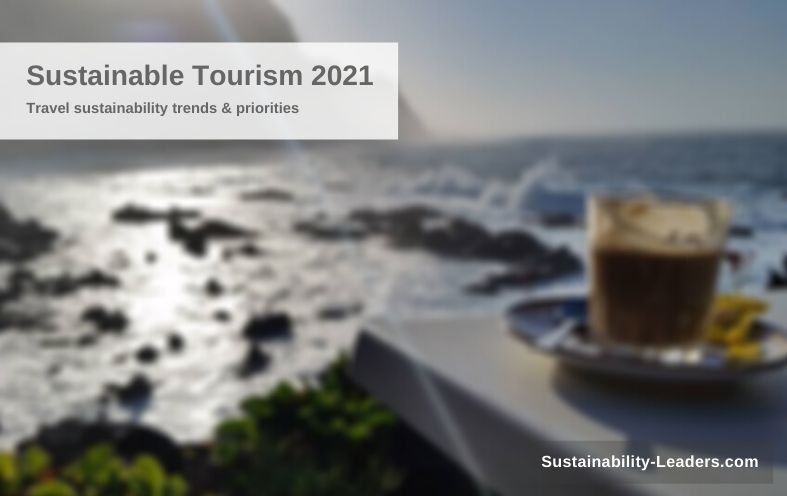
Reset, rebuild, regenerative, resilient, transform – some of the terminologies frequently mentioned in discussions concerning the future of travel, after the pandemic. But which hot topics or trends are really dominating the sustainable tourism agenda this year? Which are the priorities for destinations, tourism businesses, academics, residents, and visitors?
We asked our panel of sustainable tourism specialists. Below the answers (highlighted respondents are available as consultants or speakers).
Some of our key takeaways:
- Safeguarding the health of residents and visitors, also maintaining all the safety protocols to contain any spread of the virus is of utmost priority.
- Many destinations have understood the impacts of unbridled mass tourism and hence are vouching for regenerative tourism as the way forward, for the benefit of residents and the natural environment.
- Tackling overtourism is a definite priority: listening to the residents’ opinions with regard to the amount of tourism flow to their regions.
- There is a growing appetite for sustainable travel among travellers.
- Staycation, domestic travel, slow tourism – all have become even more popular due to international travel restrictions, and this trend is likely to continue after the pandemic.

Brian Mullis
Interview | Speaker profile
- Putting communities at the heart of tourism to improve resident, visitor, and environmental well-being.
- Helping to inspire change and build tourism back better by shifting mindsets and integrating transformative and regenerative design principles into tourism to help all life to flourish.
 Jonathon Day
Jonathon Day
Interview | Speaker profile
Regenerative tourism will remain a hot topic. This topic is reinvigorating the sustainability conversation. It is an idea that is still young and there is much work to be done to ensure it becomes broadly useful.
“Rightsizing” tourism for communities will be an ongoing theme. In the past, it was hard to imagine a world without tourism and the emphasis was on more passengers. Today, as the pandemic wanes (hopefully), communities know what life without tourism looks like and can make more informed decisions about the right level of tourism for their destination.

Kirsi Hyvaerinen
PRÁTTO Consulting d.o.o | Interview | Speaker profile
My top three would be:
- Destination management with strong and continuous involvement of the local communities.
- Dispersing tourism regionally and seasonally with the help of smart technologies (e.g., open data) – especially in those places that are (again) under pressure; the problem not being overtourism, just undermanagement.
- A no-brainer, but globally a tough one to solve it seems: reliable, transparent and fair health and safety protocols.
And last but not the least in the MICE segment: new business models including decentralised and hybrid events – e.g. fairs going away from the old ways of selling square meters to diversified ‘matchmaking market places’. Live is better and with digital, it becomes democratic as well.
 Willy Legrand
Willy Legrand
Interview | Speaker profile
The topic in the vogue is about regeneration surely. We cannot forget that the tourism sector is a job provider with millions depending on this sector for their livelihood. So regenerative tourism is equally about the socioeconomics of tourism as it is about the tourism-nature interaction.
What has transpired over the past 12 months is that looking ahead, one cannot dissociate the social from the environmental and economic pillars. The tourism industry has been shaken to its core and talks of regeneration are heartwarming for many. So that’s on the agenda in the short term but if we look further past 12 months (and arguably this is what needs to be done), we have nations that are still not making the commitments required to meet the goals set in the Paris Agreement according to the most recent UNFCCC report.
While citizens across nations see the imperative for climate action and a tourism industry that has the desire to bounce forward and decouple its development from carbon emissions, nations are trailing back. On the agenda, one could add ‘join forces to lobby and keep the pressure’.
Albert Salman
Interview
- Localising and decarbonising travel should be a top priority given the pandemic and the climate emergency. The Future of Tourism Coalition in cooperation with its 700+ signatories and Tourism Declares a Climate Emergency will push these principles especially with the Climate Summit in Scotland.
- Domestic tourism, as well as travel bubbles, will hopefully provide solutions to the tourism sector in (groups of) countries with effective herd immunity, in combination with continued very tough control measures and testing on new virus variants.
- Safe travels in international travel bubbles will more than ever be connected to a combination of Covid vaccination and testing, as long as new variants do not pop up and as long as there is effective herd immunity both among travellers and in destinations.
- Since aeroplanes and especially airports appear not to be safe places against Covid-transmission, air travel is expected to remain low. Many will hope disruptive cheap flyers like Ryanair (who have driven unsustainable mass tourism and overtourism) crash, but this remains to be seen. Long-haul carriers are probably more vulnerable, looking at Norwegian.
Amine Ahlafi
Interview
The massive confinement periods have shown that our nature and our biodiversity have visibly recovered. This showed the negative impact of our mass tourism activities and the critical need to orient ourselves towards sustainable tourism. The challenge of the tourism sector is to make all stakeholders aware of the negative externalities of mass tourism and to change the paradigm within the tourism industry. It starts with raising awareness for tourism actors and regulating what tourism offers globally.
Anna Spenceley
Interview
I think a hot topic is how to re-emerge more sustainably and build-back-better in practice, rather than reverting to business as normal. This is bolstered by market research on more demand (as this overview from a forthcoming Luc Hoffmann Institute report illustrates) – showing that there is an increasing business case for sustainable travel.
- Air Travel Sustainability survey – A survey of 464 people in April 2020 found that 58% were thinking more about the environment and sustainability now compared to before COVID-19.
- Booking.com – Travellers are becoming even more conscientious of how and why they travel, with over two-thirds (69%) expecting the travel industry to offer more sustainable travel options.
- Responsible Tourism Advisor and Solare – A global online survey of 1,764 individuals that took place in April-May 2020 found that there was a stronger conviction for sustainable tourism among younger respondents, and all nationalities mostly wished to avoid mass tourism destinations and large cities.
Fiona Jeffery
Interview
How to develop a net zero-based business model.
I am happy to contribute to a simple but replicable business model to help the industry reduce its impact. It doesn’t get rid of their own responsibility to reduce carbon footprint but it does help them contribute more effectively to community development and reduce their environmental impacts.
Gianna Moscardo
Interview
Staycations (travel closer to home or holidays at home without the travel component) and slow tourism had been emerging as options for more sustainable travel before COVID-19. One of the challenges for both these trends was to encourage people to rethink their travel and to find value and benefit from travelling less distance and slowing down. Closed borders, travel restrictions and mandatory quarantines have made these two options the only ones in many places so we have an opportunity to encourage staycations and slow travel beyond COVID-19.
But that means finding a voice to match all those that err on social media especially talking about how amazing it will be to be able to travel far and wide again. The biggest challenge for those concerned about sustainability is to politely but effectively reframe staycations and slow travel as more than just a temporary substitute but a valuable opportunity. One theme that has been emerging in Australia about staycations is seeing local travel as a way to support local communities and businesses so travel now is not just about meeting your own personal needs but about building and supporting your own communities.
Kevin Teng
Interview
I believe it will be food security and resiliency, including local/regional suppliers, diverse supply chains, and more environmentally friendly options for consumers.
Lucy McCombes
Interview
I think the following topics will be hot topics or trends likely to dominate:
- Rapid buy-in to the concept of a circular economy and reviewing how we perceive successful growth and development beyond the usual economic measures – this will require innovative planning and design of new tourism products, services, destination strategies etc that design out waste and design-in these new ways of thinking
- Increase in demand for tourist experiences which are co-created between tourists, local people and businesses to offer more meaningful and mutually beneficial experiences
- An increase in demand for sustainable/responsible outdoor experiences and environments that allow people to feel socially-distanced as a sense of personal space and safety will take some time to recover
- Increase in demand for extended stay travel products in response to more people working from home, technology developments etc – e.g. global nomads
- Increase in domestic sustainable tourism products in light of many people connecting with their own home destinations during the lockdown
- New ‘haves’ and ‘have nots’ emerging from the different ways in which pandemic has affected people’s incomes – the affordability of travel will become an increasing issue and pressure for cheaper forms of less sustainable tourism
- Development of methods to include more resilience into destination strategic policies and tourism plans
- Growing inequality between destinations in light of the inequitable distribution of COVID vaccines
In terms of priorities, businesses/the industry will inevitably be focusing on how to get a cash flow going again and provide job security to its remaining staff in line with the new requirements for travel, vaccinations, health and safety measures. Destinations, governments and the international community will need to think carefully about how to both incentivise and enforce sustainability measures to facilitate a shift to a much more sustainable sector.
Maja Pak
Interview
The Covid-19 pandemic is of course disastrous for the whole tourism industry, but it is also an opportunity to reset our values. As for the rest of the world, the priorities for Slovenian tourism will be based on sustainable trends. Digitalisation will be one of the pillars that we will address first – to improve user experience and also safety standards.
Local communities and their satisfaction with tourism will surely play a more central role, as will local experiences. People will avoid crowded destinations, we expect there will be more interest in outdoor activities and also that travellers will consider their environmental impact more than before.
In Slovenia, we will also focus on the elimination of single-use plastic and sustainable gastronomy.
Marcus Cotton
Interview
I feel excited to see the much-increased level of global awareness of sustainability in tourism as a sine qua non.
I feel the increasing focus on regenerative tourism as going beyond the ‘status quo’ of sustainability to the more proactive regeneration of tourism destinations, the rethinking of seasonality and the mind-numbing box-ticking of standard sites in favour of offbeat locations and more diverse destinations.
Hopefully, there will be a greater focus on putting local communities at the centre of tourism decision making.
Masaru Takayama
Interview
I would really hope that more tangible actions be made on the climate change issues, meaning to assess the carbon footprint and to offset it. The SDGs must also be considered at the same time.
Another could be the smart digital transformation in tourism. While we need to continue physical and social distancing, the people’s desire to travel is increasingly apparent, yet extremely limited. Allowing people to enjoy the 360-degree space with sound and music gives a certain degree of a healing atmosphere. It should be highlighted to be used in more specific objectives such as surveillance on the wild animals from poaching where the conservation efforts have fallen due to the lack of tourism money. Visitor management in the potential congestive areas, and so on.
Natalia Naranjo Ramos
Interview
Economic recovery taking into account limits and carrying capacities will be a challenge for everyone. Tourism will continue, but it must return taking into account the climate emergency context. Probably this will be the main topic on the sustainable tourism agenda. And this can only be achieved with the public, private and communities coordinated work for sustainable management of destinations and initiatives in the territories. So Governance + Cooperation + Management and Conservation will be important for Economic recovery in a climate emergency context.
Peter Richards
Interview
Good question. Everything depends on when vaccines are widely available, how effective they are, and when borders can open. Domestic and regional tourism will certainly lead, for safety and economic reasons (less money to travel). Many different kinds of research have pointed to post-COVID trends in valuing health and safety, solitude, wellness, controlled small group travel (e.g. a single-family or extended family travelling as a bubble), etc. Tourists are going to seek holidays which give them more control over who and how many people they encounter.
This is potentially an opportunity for ecotourism, CBT, etc. COVID has given the environment some breathing space, and many wish to see a gentle restart. This gentle restart may happen naturally, as a result of tourists gradually regaining their confidence to travel, or it may erupt into the first destinations which are perceived to be safe. If many people want to travel, but also want to avoid overcrowded places, then it will be crucial to building resilience and carrying capacity in smaller, traditionally secondary destinations. So, the priorities should include preparing those destinations now, not just focusing on preparing major destinations for recovery.
Roi Ariel
Interview
Over the past year, we have seen at the GSTC that many destination management organisations and government tourism departments are using this time as an opportunity to work on sustainability. While the marketing and promotional teams had little work due to restrictions, the development and sustainability teams had time to work on the integration of clear sustainability schemes (such as using the GSTC Criteria) into their long-term strategic and recovery planning. This means that sustainable tourism businesses will find it easier to receive support and promotion from the governments where they operate.
- Turismo de Portugal is launching Tourism Sustainability Plan 2020-2023 that covers many relevant issues including professional training in sustainability
- Switzerland has just launched its Swisstainable scheme
- Utah has its Red Emerald Strategic Plan to promote responsible visitation and help preserve our world-class quality of life for future generations
- Visit València plans to be carbon neutral and has designed its sustainability strategy through a control panel with indicators that unify the SDGs and the GSTC Criteria
A silver lining of the pandemic is this strong trend of destinations picking up the pace to becoming sustainable.
Steve Noakes
Interview
Cleanliness, hygiene, social distancing to prevent the spread of coronavirus.
Vik Nair
Interview
In my view, the main focus for 2021 and beyond is regenerative tourism. The tourism industry is still hopeful for a post-vaccine return to travel that will be better — more responsible, smarter, greener and less crowded destination. Taking one step further than the concept of sustainable tourism, regenerative travel or tourism or basically leaving a place better than you found it, maybe the way forward for global tourism priorities.
Pre-COVID-19, we have failed in general to protect the very resources that tourism relies on — commitment from the host and guest in stewarding the human and natural resources. Regenerative tourism provides an opportunity to get back to the sustainability philosophy.
Sustaining a destination (net zero) is considered a low bar post-COVID-19. What we need is more than sustaining but making the destination better than before (net positive). Our aim should not be to do the minimal to maintain the status quo, but we should be focused on restoring and regenerating the capability to live. This should certainly be the premise of all tourism strategies and development in the future.
More about the sustainable tourism expert panel here – including previous sessions and answers to some of the most pressing issues linked to making tourism more sustainable.
Do you have a topic in mind that you think needs to be highlighted in 2021? Get in touch!











